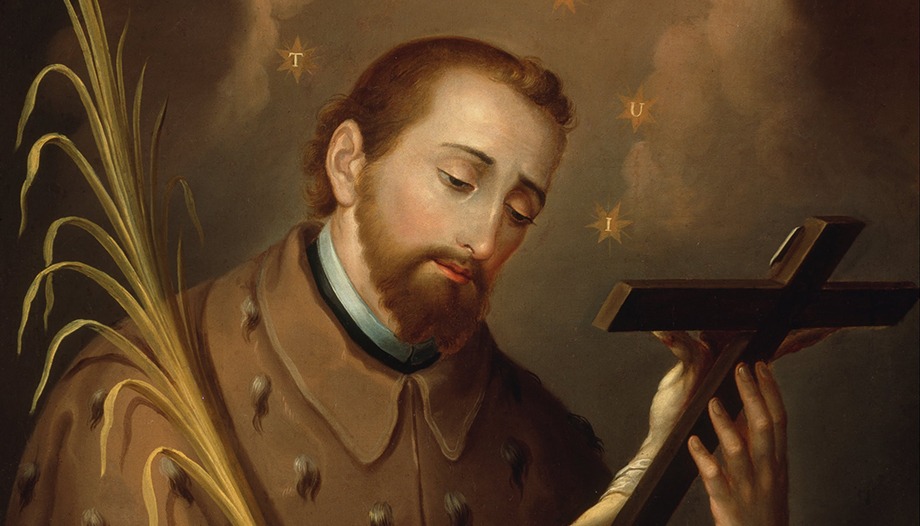St. John Nepomucene was born around 1340 in Nepomuc, today's Czech Republic. He studied at the University of Prague and then followed a course in Canon Law at the University of Padua, in northern Italy. In 1380 he was appointed parish priest in Prague and was soon promoted to the dignity of canon of the church of St. Giles. In 1393, John of Jenštejn, archbishop of Prague, appointed him his vicar general. The new vicar did not enjoy a good reputation among his contemporaries; he was wealthy, owned houses and lent money to nobles and priests.
Entry into court
Queen Joan of Bavaria, wife of the unconscionable Wenceslas IV, ruler of the German empire and the lands of Bohemia, had the opportunity to meet him, and soon after appointed him her confessor. Therefore, following the custom of the time, John Nepomucene has to live in the court of Wenceslas, to sit at his table on occasions and to thank him for the food he offers him. There he painfully observes the king's cruel treatment of his servants. More than once he sees how the sovereign unjustly uses the services of the executioner, who has more work than strict equity would make him want. It is said that on one occasion he was presented with a badly roasted fowl and, without further explanation, he ordered the poor cook to roast it.
No one, however, dares to argue anything to the sovereign lord; everyone is afraid of him: his wife, the dignitaries of the Court, his people. Only Juan Nepomuceno was not afraid of him, and he used to warn the king that his attitude did not correspond to the principles of one who confesses Christian. Juan's bravery is admired by all, but the king's reaction is not long in coming. He calls the executioner and entrusts him with a new job: for the moment, to imprison Juan Nepomuceno, then...
The envy of a king
The legend tells that, after a few days, John is brought back to the monarch, who tempts the saint with honors and riches, in exchange for the revelation of some details of his wife's confessions. Some envious person had whispered in the king's ear an infamous suspicion about the empress's infidelity, and Wenceslas was seized by terrible jealousy. He knew that the queen was going to confession to Father John, and that she was going to communion. Wenceslaus wanted to know the details of his wife's possible infidelity and sent for the confessor.
"Father John, you know the terrible doubt that torments me, and you can dispel it. The empress confesses to you. A word would be enough for me...". "Majesty," replied the confessor, "how is it possible that you propose such an infamy to me? You know that I can reveal nothing. The secret of confession is inviolable". Juan knew that his life was at stake. No one dared to oppose the tyrant. Only Juan again refused his plans, and that is what led him to the dungeon.
"Father John, your silence means that you renounce your freedom."
"I will never consent to such sacrilege. Command anything else. In this I say the same as St. Peter: "We must obey God rather than men". A few hours later, John was thrown back into prison and subjected to terrible tortures to make him yield. He was cruelly tortured in order to make him change his attitude, but he did not give in and even lost consciousness.
Juan Nepomuceno's days were filled with new interviews with the king, to make him new proposals of honors in exchange for the secret of confession, but in vain. His refusals meant renewed tortures, until in a last visit he was granted the last chance: either life (with honors, dignities and riches), or death. And the holy priest did not hesitate: death.
The death of the good confessor
Nevertheless, the queen obtained his freedom, and healed his wounds. He was still able to preach in the cathedral, announcing his death, convinced that the tyrant would never forgive him. Shortly afterwards, John went to prostrate himself at the feet of Our Lady of Bunzel. On his return, Wenceslaus sets a trap for him. The executioners awaited him by the bridge and threw him into the Vltava River. It was April 19, 1393.
His epitaph, in the cathedral of St. Vitus (Prague), reads: "Here lies John Nepomucene, confessor of the Queen, illustrious for his miracles, who, for having kept the sacramental secrecy, was cruelly martyred and thrown from the bridge of Prague into the Vltava River by order of Wenceslas IV in 1393".
His tongue is preserved in the cathedral. In 1725 (more than 300 years after his death) a commission of priests, doctors and specialists examined the tongue of the martyr, which was uncorrupted, although dry and gray. And suddenly, in the presence of all, it began to fluff up and appeared as of a living person with the color of fresh flesh. Everyone got down on their knees before this miracle, witnessed by so many people and so important. It was the fourth miracle to declare him a saint, whose canonization was carried out by Benedict XIII in 1729.
St. John Nepomucene has been called for many centuries "the martyr of the secret of confession", and is considered Patron of sacramental secrecy, as well as of fame and good name, because of the logical link that these two patronages possess.











